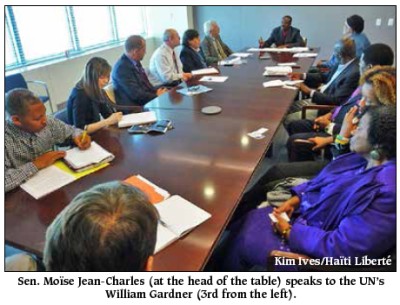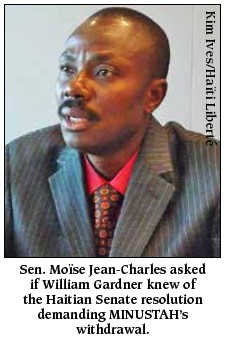|
by Kim Ives
 On
Oct. 12, the United Nations Security Council voted unanimously
to renew for one more year the foreign military occupation of
Haiti known as the UN Mission to Stabilize Haiti or MINUSTAH,
which has been deployed in Haiti since Jun. 1, 2004. On
Oct. 12, the United Nations Security Council voted unanimously
to renew for one more year the foreign military occupation of
Haiti known as the UN Mission to Stabilize Haiti or MINUSTAH,
which has been deployed in Haiti since Jun. 1, 2004.
However, the Haitian people,
and increasingly people throughout Latin America, are calling
for UN troops to immediately leave Haiti and respect Haiti’s
sovereignty and right to self-determination.
This was the message of an
international delegation led by Haitian Senator Moïse
Jean-Charles which met for almost two hours with high-ranking UN
officials on Oct. 11, the day before the vote.
The 10-member delegation,
composed of unionists, activists, and journalists, met with
William Gardner, the Senior Political Affairs Officer of UN
Department of Peace-Keeping Operations’ Europe and Latin America
Division, and three of his Political Affairs Officers, Patrick
Hein, Ekaterina Pischalnikova, and Nedialko Kostov.
Sen. Moïse’s delegation
included Julio Turra, National Executive Director of the United
Trade Union Central of Workers of Brazil (CUT); Pablo Micheli,
General Secretary of the the Confederation of Workers of
Argentina (CTA); Fignolé St. Cyr, General Secretary of the
Autonomous Confederation of Haitian Workers (CATH); Jocelyn
Lapitre, a leader with the Front against Profit (LKP) in
Guadeloupe; Colia Clark of the Guadeloupe-Haiti Campaign
Committee; Alan Benjamin of the International Liaison Committee
of Workers and Peoples (ILC); Robert Garoute, of the Progressive
Movement for Haiti’s Development (MPDH); Geffrard Jude Joseph,
the director of Radio Panou; and Kim Ives, a journalist with
Haiti Liberté newspaper.
 The meeting, which became heated at times, took place on the 27th
floor of the UN’s General Secretariat in New York. The
delegation told the UN officials that the MINUSTAH was a
violation of the UN Charter, as well as of Haiti’s constitution,
sovereignty, and democratic will. Gardner argued that the
mission was winding down but had to remain in some form until
Haiti’s police force had reached 15,000 (it is now 11,000), was
well trained, and deployed throughout Haiti.
The meeting, which became heated at times, took place on the 27th
floor of the UN’s General Secretariat in New York. The
delegation told the UN officials that the MINUSTAH was a
violation of the UN Charter, as well as of Haiti’s constitution,
sovereignty, and democratic will. Gardner argued that the
mission was winding down but had to remain in some form until
Haiti’s police force had reached 15,000 (it is now 11,000), was
well trained, and deployed throughout Haiti.
“I want to tell you that
MINUSTAH is leaving,” Gardner said “But if we remove the
MINUSTAH too quickly, we risk that the country might not reach
the level of stability to ensure that the United Nations will
never return” as a peace-keeping mission in Haiti.
But the delegation rejected
this argument. “Haiti doesn’t really have a problem of security
and stability,” responded unionist Fignolé St. Cyr. “Haiti has a
docile people, who believe in their own labor and who are
fighting for a better life.”
“Haitians are a civilized
people,” added Radio Panou’s Jude Joseph.
“Our delegation is part of a
broad continental campaign growing since 2004 against MINUSTAH’s
presence in Haiti because we believe that nobody committed to
the principles of democracy and sovereignty can accept that a
multinational occupation force be deployed in Haiti,” said Julio
Turra, whose union initiated the meeting, as it had a previous
one last year with UN officials. “Sadly, the CUT, our trade
union organization, was founded by [former Brazilian president]
Lula when he was a trade unionist, so we are ashamed that he
allowed the Brazilian army to become MINUSTAH’s military
command. We have resolutions here from national congresses,
representing over 3000 worker centers, saying that the Haitian
people’s sovereignty must be respected.” Turra also presented
Gardner with a packet of letters from organizations in Mexico,
Bolivia, Ecuador, Peru and Uruguay.
Sen. Moïse Jean-Charles asked
Gardner if he was aware that the Haitian Senate had issued a
resolution on Sep. 20, 2011 which called on the Haitian
government to “give to the UN Security Council a formal demand
for the gradual, orderly and complete withdrawal of all
detachments of MINUSTAH in a period not exceeding one year or no
later than Oct. 15, 2012.”
Gardner appeared to be unaware
of the resolution.
Sen. Moïse also raised the
question of reparations from the UN to the Haitian people for
the cholera epidemic the UN has unleashed in Haiti, citing the
suit brought against the UN last Nov. 3 by the Office of
International Lawyers (BAI) in Haiti on behalf of 5000 cholera
victims.
Gardner responded that the suit
was still with the UN’s “legal department” and that he couldn’t
comment on it.
“There was a vote in the
Senate, a sovereign vote of the people expressed through their
elected representatives, and you’re not even talking about it?”
Alan Benjamin exclaimed to Gardner. “It doesn’t exist? For those
of us committed to democracy, how can we accept that? How can
you accept that? It is as if the lawsuit demanding reparations
for cholera doesn’t exist. Yet this is a demand voiced by the
people of Haiti, and increasingly, the whole continent.”
Sen. Moïse also questioned the
death of Gérard Jean-Gilles, a 16-year-old boy who was found
hung inside a MINUSTAH base in Cap Haïtien in August 2010 after
he was accused of stealing $200 from a UN interpreter. The money
was later found, but the UN blocked the Haitian justice system’s
attempts to investigate the suspicious death.
Gardner said he would look into
the matter.
Most alarmingly, Gardner
implied that the UN might remain in Haiti until the next Haitian
presidential election in 2015. “We are sure there will be an
assessment of the situation this year to see if we will continue
to remove the military and police,” Gardner said, “but we
also know that the next presidential election will be
critical to the process of stabilization, peace and development
in Haiti.”
Gardner also
claimed that the UN
had begun planning a troop draw-down in 2009 but that the Jan.
12, 2010 earthquake changed those plans.
All the delegation members took
part in the discussion and made strong cases against the UN’s
military mission. “If the United Nations genuinely wants to help
the Haitian people, they should do like Cuba and Venezuela,”
exclaimed Robert Garoute of the MPDH. “These are the two
countries that really help Haiti after, and even before, the
earthquake. There is not a single Cuban or Venezuelan soldier on
Haiti’s territory. But there are Cuban doctors. There is
Venezuelan oil. Venezuela and Cuba are building an international
airport in Cap Haitien. This is the kind of help that Haiti
needs. Haiti does not need soldiers! We are not at war. Haiti is
an independent country since 1804. Why send troops? If you
really want to help people, build schools. Send doctors, as Cuba
did.”
Journalist Jude Joseph echoed
the sentiment. “We have problems of roads, water, electricity,
and food,” he said. “Presently, the whole country is rising up
to protest against hunger. But the little money that there is
goes to pay UN soldiers. Even [former] President [René] Préval
asked: instead of giving us soldiers, give us technicians. We
don’t need soldiers with big guns and tanks. They don’t help us
with any development. On the contrary, they kill almost 8,000
Haitiains by bringing cholera to Haiti.”
In response, Gardner recognized
that “in Haiti, there is not a war situation; it is a
socio-economic problem and a matter of some government
dysfunction, but it is also a question of violence in certain
neighborhoods in Port-au-Prince, Gonaïves and Cap Haitien and of
course, Cité Soleil.”
He claimed that “when the
United Nations arrived in Haiti in 2004 to make an evaluation of
the situation, they first thought that they might have a problem
with the former Armed Forces of Haiti” but “when they arrived,
they found a very different situation, and it was the presence
of these armed gangs ... They started in 2004 a
sort of urban warfare in urban centers. This is why we
deployed a peace-keeping operation with armed troops.”
But delegation members
countered Gardner’s thesis of urban “gangs.”
“Mr. Gardner cited the gangs in
Cité Soleil, Belair, Pont Rouge in 2004” said Fignolé St. Cyr.
“The destabilization of 2004 was produced and provoked precisely
to prevent Haiti from celebrating the bicentennial of its
independence in cahoots with certain local lackeys who were
working with the future occupiers.... In 2004, the de facto
Prime Minister they imposed was a former UN official. Once in
power, he requested UN troops for Haiti. The problem that you
mentioned in Cité Soleil and Belair came three months after
MINUSTAH’s arrival, and actually was the beginning of a
resistance.”
Journalist Kim Ives reinforced
the point. “There was a military intervention and occupation by
the U.S. Marines in 1915, as you know, and at that time they
also called those who resisted - the Cacos - bandits... I
personally met some of the leaders in the slums of Cité Soleil
and Belair, and they were not bandits. They were fighters
against a coup and a foreign occupation... For the people, for
the citizens of Cité Soleil, a so-called gang leader like Dread
Wilmer, whom the United Nations called a bandit and criminal,
was a nationalist hero” just like the Cacos’ leader Charlemagne
Péralte, whom the U.S. Marines also called a bandit. “So the UN
was fighting those resisting the coup and occupation, and not
the real bandits who overthrew the legitimate and elected
Aristide government, like Guy Philippe, Jodel Chamblain, and
others.”
Ives noted in the debate that
the UN could have gone after Senator Moïse because “you could
say he was a bandit, because he was fighting against the
occupation and coup d'état.”
Moïse then revealed that in
fact the MINUSTAH had come to his home in the northern town of
Milot and chased him for six or seven months after the coup.
“MINUSTAH was acting in the service of the political leaders [of
the 2004 coup] who were anti-Moïse, anti-Aristide. Afterwards
they said: Excuse us, Mayor Moïse. It was a mistake.”
Gardner said he would
investigate this incident also.
Jocelyne Lapitre decried the
$850 million spent each year for MINUSTAH’s 10,000 soldiers and
police officers. Under the renewal, the force is to be scaled
back by about 2,000 over the next year. “When you realize how
much money is mobilized for the occupation forces, and when you
look at life in Haiti, it's a real shame," he said. "We think
this money should go to education, to hospitals, to train police
officers, and to make life better in Haiti."
The Argentinian unionist Pablo
Micheli had rescheduled a general strike in Argentina so he
could be in New York on Oct. 12. “Because of our commitment to
the anti-colonial struggle, we have a moral obligation to
repudiate this occupation by UN troops, knowing that there are
Argentine troops in the force,” he said.
The meeting closed with remarks by Colia Clark, a
veteran of the U.S. civil rights struggles, who had worked and
marched with Martin Luther King, Jr.
“We will not stop until the UN is out of Haiti and has paid
reparations to Haiti for all the deadly crimes committed against
the world’s first democracy, not a slavocracy like America,” she
told the UN officials.
“Haiti must have self-determination now.” |